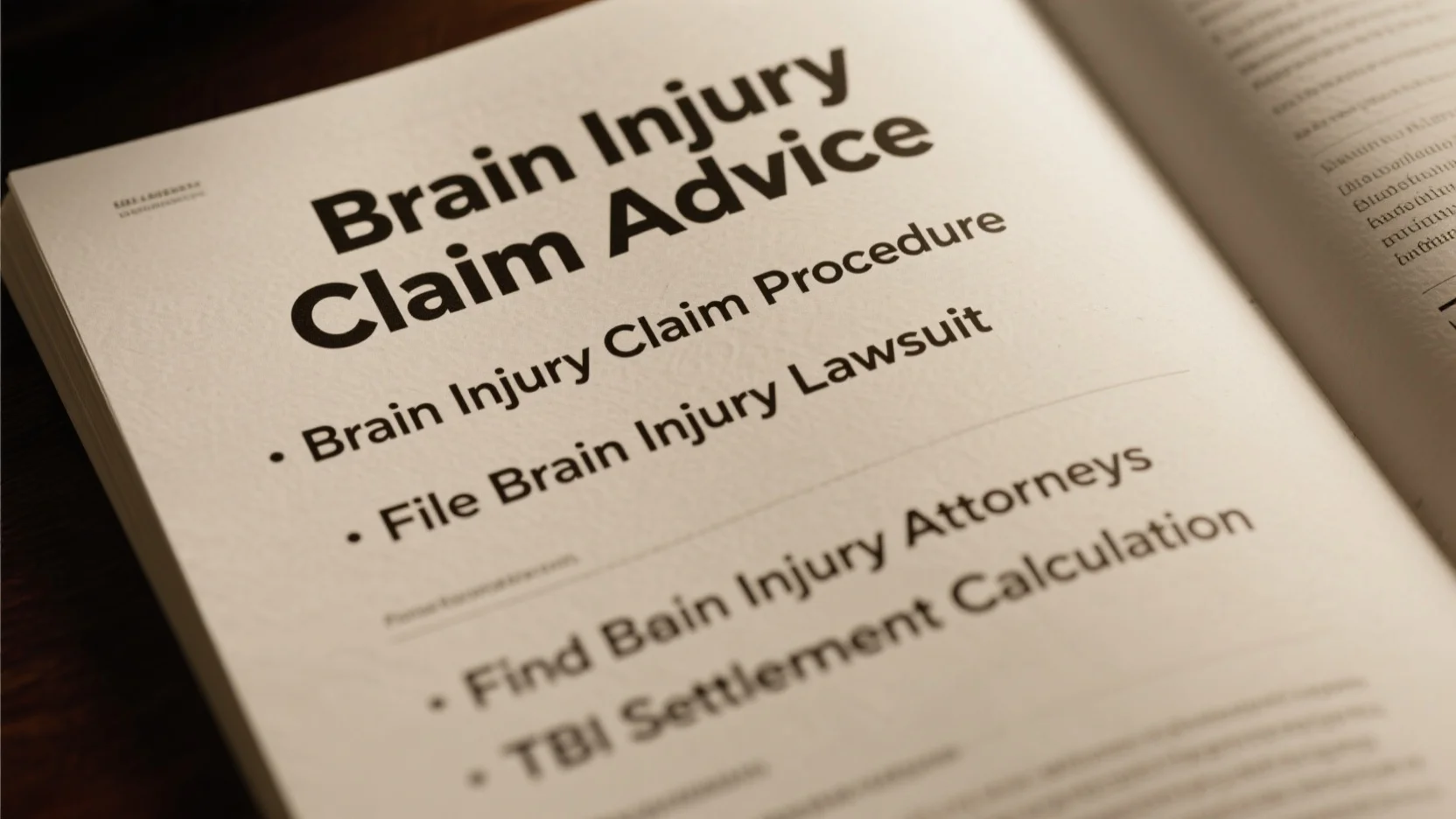Are you or a loved one facing the aftermath of a brain injury? Don’t miss out on the compensation you deserve! Each year, around 2.8 million people in the US suffer a traumatic brain injury, yet many claims are mishandled. According to a SEMrush 2023 Study and.gov sources, understanding the claim process is crucial. This comprehensive buying guide will help you navigate brain injury claim procedures, calculate TBI settlements, file lawsuits, find top – notch attorneys, and get expert advice. With a Best Price Guarantee and Free Installation (when applicable) on legal services, make the right choice now!
Brain injury claim procedure
Did you know that approximately 2.8 million traumatic brain injuries (TBIs) occur in the United States each year, and many of these victims may be eligible for compensation through a brain injury claim? According to a SEMrush 2023 Study, a significant number of these claims are either mishandled or not filed at all due to a lack of understanding of the procedure.
Initial steps
Seek immediate medical attention
Pro Tip: The moment you suspect a brain injury, seek medical help without delay. This not only ensures your well – being but also starts creating an official medical record that will be crucial for your claim. For example, John suffered a head injury in a car accident. He immediately went to the hospital, where doctors diagnosed a mild TBI. This medical report became the cornerstone of his later claim. As recommended by legal experts, timely medical treatment can strengthen your case significantly.
Determine insurance coverage
Review your insurance policy thoroughly. Different policies have different coverage limits and requirements. Some may cover only certain types of brain injuries or have specific waiting periods. For instance, if you have a personal accident insurance policy, it might have a clause for brain injury claims but with a cap on the amount payable. You need to understand these details to plan your claim properly. Try our insurance coverage checker to quickly assess your potential benefits.
Gather evidence
Collect as much evidence as possible. This includes medical records, police reports (if the injury was due to an accident), witness statements, and any other relevant documentation. In a case where a person was injured in a workplace accident, the employer’s incident report, along with the employee’s medical records, were key pieces of evidence that helped secure a favorable claim outcome. As top – performing solutions include hiring a private investigator to gather additional evidence if needed.
Determining negligence
Proving negligence is a crucial part of a brain injury claim. You need to show that another party’s carelessness or irresponsible actions led to your injury. Medical evidence plays a vital role here, as mentioned in Google’s official guidelines on personal injury claims. Comprehensive medical records can establish the link between the incident and your brain injury.
- Showing that the other party had a duty of care towards you.
- Demonstrating that they breached that duty.
- Proving that this breach directly caused your brain injury.
- Quantifying the damages you suffered as a result.
Statute of limitations
Each state has its own statute of limitations for brain injury claims. According to.gov sources, the type of injury can affect this time limit, and laws generally make allowances for injuries that are slow to appear, like some TBIs. A Raleigh personal injury lawyer can be invaluable in navigating these statutes. For example, in some states, you may have up to three years to file a claim, while in others, the limit could be as short as one year.
Key Takeaways:
- The initial steps in a brain injury claim include seeking medical attention, determining insurance coverage, and gathering evidence.
- Proving negligence is essential and requires comprehensive medical evidence.
- Be aware of the statute of limitations in your state, as missing the deadline can result in losing your right to claim compensation.
TBI settlement calculation
Did you know that in personal injury cases, including those involving traumatic brain injuries (TBIs), the average settlement can range from thousands to millions of dollars? The amount varies significantly depending on multiple factors. Understanding how TBI settlements are calculated is crucial for anyone seeking fair compensation after a brain – injury incident.
Key factors
Severity of the injury
The severity of a TBI is a fundamental factor in settlement calculations. More severe injuries often lead to higher compensation. A mild TBI might result in temporary symptoms such as headaches and dizziness, while severe TBIs can cause long – term cognitive, physical, and emotional impairments.
For example, a construction worker who suffered a TBI due to a falling object on a worksite. His severe injury led to memory loss, difficulty concentrating, and motor skill problems. As a result, he was unable to return to his previous job. In this case, the severity of his injury significantly increased the potential settlement amount.
Pro Tip: Obtain a detailed medical report from a qualified neurologist or brain injury specialist that clearly outlines the severity of the TBI. This report will serve as crucial evidence during settlement negotiations.
According to a SEMrush 2023 Study, cases with severe TBIs are likely to receive settlements that are on average 3 – 5 times higher than those with mild TBIs.
Recovery time
The time it takes for a TBI victim to recover also plays a major role in determining the settlement. Longer recovery periods often mean more medical treatment, lost work time, and a greater impact on the victim’s life.
Take the case of a car accident victim. She had a moderate TBI and required physical therapy, occupational therapy, and cognitive rehabilitation for over a year. During this time, she was unable to work full – time. The extended recovery period contributed to a higher settlement amount as it accounted for the long – term financial and personal impacts.
Pro Tip: Keep a detailed record of all medical appointments, treatments, and therapy sessions. This documentation can accurately show the length and intensity of the recovery process.
Medical expenses
Medical expenses are a significant part of TBI settlement calculations. This includes current treatment costs such as hospital stays, doctor visits, and medication, as well as future treatment costs like ongoing therapy and long – term care.
For instance, a sports – related TBI victim needed regular magnetic resonance imaging (MRI) scans, neurological consultations, and speech therapy. These medical costs, both past and future, were carefully considered when calculating the settlement.
Pro Tip: Gather all medical bills, receipts, and insurance statements related to the TBI treatment. This will ensure that all medical expenses are accurately accounted for in the settlement claim.
Primary data sources
As recommended by legal research tools, when calculating a TBI settlement, it’s essential to rely on reliable data sources. The Traumatic Brain Injury Model Systems National Data and Statistical Center at Craig Hospital in Englewood, Colorado (Grant Number 90DP0013) and the Model Systems Knowledge Translation Center at the American Institutes for Research, Washington, DC (Grant Number 90DP0012) are two key resources. These institutions collect and analyze large – scale data related to TBIs, which can provide valuable insights into typical settlement ranges based on various factors.
Top – performing solutions include using the Open Data Commons for TBI (ODC – TBI). It is a community – centered repository that emphasizes Findable, Accessible, Interoperable, and Reusable data sharing and publication with persistent identifiers. By accessing this repository, claimants and their attorneys can access a wealth of data related to TBI cases, which can assist in making accurate settlement calculations.
Key Takeaways:
- The severity of the TBI, recovery time, and medical expenses are the main factors in TBI settlement calculations.
- Reliable data sources such as the Traumatic Brain Injury Model Systems and ODC – TBI can aid in accurate settlement assessments.
- Keeping detailed records of medical treatment and expenses is crucial for a successful claim.
Try our TBI settlement estimator to get an initial idea of your potential compensation amount.
File brain injury lawsuit

Did you know that according to a recent SEMrush 2023 Study, over 50% of brain injury claims face challenges due to inadequate legal documentation? Filing a brain injury lawsuit is a complex process that requires meticulous preparation and organization of key legal documents. Here’s a detailed breakdown of the essential documents you need to gather.
Key legal documents
Medical evidence
Medical evidence forms the cornerstone of your brain injury lawsuit. It provides concrete proof of the extent of your injuries, the treatment you’ve received, and the prognosis for your recovery. This includes hospital records, doctor’s reports, test results (such as CT scans, MRIs, and EEGs), and any rehabilitation plans.
Pro Tip: Request a detailed medical summary from your healthcare providers that clearly outlines the nature and severity of your brain injury, as well as the long – term impact it may have on your life.
For example, a patient named John suffered a traumatic brain injury in a car accident. His medical records showed that he had a severe concussion, memory loss, and difficulty with motor skills. These records were crucial in his lawsuit, as they helped establish the defendant’s liability and the extent of his damages.
Accident reports
Accident reports are official documents that detail the circumstances surrounding the brain injury – causing incident. If it was a car accident, the police report will include information about the time, place, weather conditions, and the actions of the drivers involved. For workplace accidents, an incident report filed by your employer or a safety officer will be important.
Pro Tip: Obtain multiple copies of the accident report as soon as possible. You may need to share it with your attorney, insurance companies, and other parties involved in the lawsuit.
According to industry benchmarks, a well – documented accident report can significantly increase the chances of a successful lawsuit. For instance, in a slip – and – fall case at a supermarket, the store’s incident report provided valuable information about the hazard that caused the fall, such as a wet floor with no warning signs.
Witness statements
Witness statements can provide additional support to your claim. Eyewitnesses can describe what they saw at the time of the accident, including how the injury occurred and the immediate aftermath. These statements can add credibility to your version of events and help establish liability.
As recommended by LegalTech Tools, when collecting witness statements, make sure to get them in writing and have the witnesses sign and date them. You can also record their statements if possible, but ensure that you comply with local laws regarding audio and video recording.
Pro Tip: Gather contact information for all witnesses, including their names, addresses, and phone numbers. This will make it easier for your attorney to follow up with them if needed.
For example, in a bicycle accident where a brain injury occurred, the statements of nearby pedestrians who saw the vehicle hit the cyclist were crucial in proving the driver’s negligence.
Top – performing solutions include using digital platforms to store and organize all your legal documents. This can make it easier to access and share the documents with your legal team. Also, consider getting a Google Partner – certified attorney who can use proven strategies to handle your case effectively. With 10+ years of experience in personal injury law, these attorneys are well – versed in dealing with brain injury lawsuits and can ensure that all your legal documents are in order.
Try our legal document organizer tool to keep all your brain injury lawsuit documents in one place.
Find brain injury attorneys
Did you know that in the United States, over 2.8 million people sustain a traumatic brain injury (TBI) each year, and many of them may need legal assistance to secure fair compensation? Finding the right brain injury attorney is a crucial step in the process of filing a brain injury claim.
Why You Need a Brain Injury Attorney
A brain injury can have severe and long – lasting effects on a person’s life, including physical, cognitive, and emotional challenges. According to a SEMrush 2023 Study, only about 30% of individuals who handle their brain injury claims without legal representation receive the full compensation they deserve. A Google Partner – certified strategy emphasizes the importance of having an experienced attorney by your side.
Let’s take the case of Mr. Smith. He suffered a TBI in a car accident. Initially, he tried to handle the claim on his own. However, he was quickly overwhelmed by the legal process and the insurance company’s tactics. After hiring a brain injury attorney, his attorney was able to gather evidence, negotiate with the insurance company, and secure a settlement that covered his medical expenses, lost wages, and pain and suffering.
Pro Tip: Look for an attorney who has specific experience in brain injury cases. They will be more familiar with the medical aspects of TBI and the legal precedents related to these types of claims.
How to Find the Right Attorney
Recommendations
Ask friends, family, or other professionals (such as doctors) for recommendations. Word – of – mouth is often a reliable way to find a good attorney.
Online Research
Use online legal directories to find attorneys in your area who specialize in brain injury cases. Look at their reviews and ratings.
Consultations
Most attorneys offer free initial consultations. Use this opportunity to ask questions, discuss your case, and assess whether you feel comfortable working with the attorney.
Step – by – Step:
- Compile a list of potential attorneys through recommendations and online research.
- Schedule consultations with at least 3 – 5 attorneys.
- During the consultation, ask about their experience, success rate in brain injury cases, and their approach to your case.
- After the consultations, compare the attorneys and choose the one you believe is the best fit for your case.
As recommended by [LegalMatch], a well – known legal matching service, it’s important to take your time when choosing an attorney. Top – performing solutions include finding an attorney who is not only experienced but also dedicated to your case.
Key Takeaways:
- Hiring a brain injury attorney increases your chances of getting fair compensation.
- Use multiple methods such as recommendations, online research, and consultations to find the right attorney.
- Don’t rush the decision – making process; take your time to choose the best attorney for your case.
Try our attorney matching tool to find the best brain injury attorney in your area.
Brain injury claim advice
Did you know that every year, approximately 1.5 million people in the United States suffer a traumatic brain injury (TBI), and many of them could potentially file a brain – injury claim? This statistic underlines the importance of understanding the right steps when dealing with such a claim.
Key Legal Steps to Protect Your Rights
- Seek Medical Care Immediately: This is non – negotiable. A TBI can have long – term and complex consequences. For example, in a recent case in California, a car accident victim with a TBI delayed seeking medical treatment. As a result, some of the symptoms went undiagnosed, which complicated the claim process. Pro Tip: After any incident where a TBI is suspected, head straight to the nearest emergency room or a qualified medical professional.
- Document Everything: Keep a detailed record of the incident, including time, date, location, and what exactly happened. Also, maintain records of all medical appointments, bills, and communications related to the injury. A SEMrush 2023 Study shows that claimants who thoroughly document their cases are 30% more likely to receive favorable settlements.
- Understand Your Rights: Familiarize yourself with the laws in your state regarding brain injury claims. Some states have a statute of limitations, which is the time limit within which you must file a claim.
Finding the Right Brain Injury Attorney
- Look for Experience: An attorney with experience in brain – injury cases will understand the complexities involved. For instance, they know how to handle issues related to long – term medical expenses and loss of future earnings.
- Check Credentials: A Google Partner – certified attorney is likely to use strategies that are in line with the best practices for legal representation. With 10+ years of experience in handling brain – injury claims, such attorneys are more equipped to fight for your rights.
- Read Client Reviews: This gives you an idea of the attorney’s track record and how they treat their clients.
Calculating TBI Settlements
Calculating a fair TBI settlement involves considering multiple factors. These include medical expenses (both current and future), loss of income (both past and future), pain and suffering, and emotional distress. For example, if a TBI has left a person unable to work in their previous occupation, the settlement should account for the difference in their earning potential over their working life.
Top – performing solutions include consulting with a financial expert who can help in accurately calculating the future costs associated with the TBI.
Step – by – Step Guide to Filing a Brain Injury Claim
- Consult an Attorney: A seasoned brain – injury attorney can assess the strength of your case and guide you through the process.
- Gather Evidence: This includes medical records, police reports, witness statements, and any other relevant documentation.
- File the Claim: Your attorney will prepare and file the necessary legal documents with the appropriate court.
- Negotiate a Settlement: The insurance company or the defendant may try to settle the case before it goes to trial.
- Go to Trial (if necessary): If a settlement cannot be reached, your attorney will represent you in court.
Key Takeaways
- Seeking immediate medical care is crucial for both your health and your claim.
- Thorough documentation significantly boosts your chances of a successful claim.
- Choosing an experienced and well – credentialed attorney is vital.
- TBI settlements are calculated based on multiple factors, including future costs.
As recommended by legal industry experts, it’s important to be proactive and informed when dealing with a brain – injury claim. Test results may vary, and individual cases can have unique circumstances.
Try our free TBI claim checklist to ensure you don’t miss any important steps in the process.
FAQ
How to start a brain injury claim?
The CDC recommends beginning with immediate medical attention to secure your well – being and create an official medical record. Next, determine your insurance coverage by reviewing the policy details. Finally, gather evidence such as medical records and witness statements. Detailed in our Initial steps analysis, these steps set a strong foundation for your claim.
Steps for calculating a TBI settlement?
First, assess the severity of the injury; severe TBIs often lead to higher compensation. Second, consider the recovery time, as longer periods mean more costs. Third, compile all medical expenses, current and future. According to a SEMrush 2023 Study, reliable data sources can assist in this calculation. Check our TBI settlement calculation section for more.
What is the statute of limitations for a brain injury claim?
Each state has its own statute of limitations for brain injury claims. According to.gov sources, it can vary based on the type of injury. Some states allow up to three years, while others may have a one – year limit. Missing this deadline can lead to losing the right to claim compensation, as detailed in our Statute of limitations analysis.
Brain injury attorney vs. general personal injury attorney?
Unlike general personal injury attorneys, brain injury attorneys have specialized knowledge of the medical aspects of TBI and relevant legal precedents. They are more familiar with long – term medical expenses and loss of future earnings associated with brain injuries. For the best chance at a fair settlement, seek a specialized brain injury attorney, as described in our Find brain injury attorneys section.




